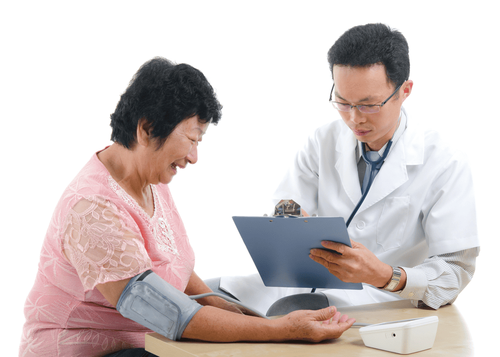This is an automatically translated article.
For the best health care of 50 year old women, it is a prerequisite that adequate screening tests are carried out. That helps the doctor assess your health condition and give the most appropriate advice.
1. Why should women health screening test 50 years old?
Since menopause can bring many changes to your body, the age of 50 is the right time for you to have your overall health checked. According to the Centers for Disease Control and Prevention (CDC), about 70% of people between the ages of 50 and 64 have been diagnosed with at least one chronic illness. Many of them have 2-3 different pathologies. Detecting potential health problems early, when they are easiest to treat, can help cure diseases or prolong lives.
Despite the fact that early screening tests can help people stay healthy for longer, only about 25% of adults aged 50 - 64 years get regular checkups, including vaccinations and screening (according to CDC).
According to JoAnn Manson, professor of medicine at Harvard Medical School: Women should regularly talk with their doctors about the screening tests that are most appropriate for them (based on family history, age, and health). generality). For example, if you have ulcerative colitis or Crohn's disease, you may have a higher risk of colon cancer than people without the condition. Or if a loved one has breast cancer, you should ask your doctor about when to be screened for this disease,...
To prepare before going for screening, you should:
Find out about your health history of your family members. Cancer, diabetes, and cardiovascular disease can increase the odds of the disease running in families; Write down a list of questions and then ask your doctor to get all your concerns answered; Thinking about the future, do you foresee any possible health problems in the next few years. Now is the time to talk to your doctor.

Chăm sóc sức khỏe phụ nữ tuổi 50 là điều rất cần thiết
2. 8 health screening tests for women aged 50
To take the best care of a 50 year old woman's health, you should perform the following screening tests:
2.1 Screening for hepatitis C
Screening subjects: People born between 1945 - 1965. As children, they may have been infected with hepatitis C through blood transfusions or other risk factors before this virus was discovered in 1989. ; Why to get screened: Over time, the hepatitis C virus damages the liver, increasing the risk of liver cancer and organ failure. Today, screening for hepatitis C is mandatory for early detection when the liver suffers little damage; How to screen: The doctor will draw the patient's blood to test for the presence of hepatitis C antibodies - a sign that you may have been infected at some point in your life; Screening afterwards: If the results are negative, you may not need other tests (unless your risk factors are changed). If you test positive for the virus, your doctor will do a follow-up test to determine if you have hepatitis C. According to the CDC, about 15 to 25 percent of hepatitis C patients will clear the virus on their own, while others develop a chronic infection.
2.2 Mammograms
Screening subjects: Recommended for the first time for women aged 40 - 50. In health care for women aged 50, screening should be performed every 2 years from the age of 50. You should talk to your doctor about screening, especially if you have a family history of breast cancer; Why to get screened: This test gives you the opportunity to find breast lumps early before they progress and spread. According to a 2016 study, mammograms in women aged 50 - 69 years can reduce the risk of advanced breast cancer by 20%; How it's screened: A mammogram, like a chest X-ray, shows cancerous tissue that can't be seen with the naked eye. But some women who are at high risk, for example BRCA carriers, may need a breast MRI instead of a mammogram. You should talk to your doctor about the best screening option for you; Follow-up screening: Depending on your test results and breast tissue density, you may be asked to return for a follow-up exam in 1 or 2 years.
2.3 Bone density test
Screening subjects: Women aged 65 or earlier if you have a family history of osteoporosis or fractures. You should tell your doctor if your mother has osteoporosis; Why to get screened: A person's bone mass and density peak in their 20s. Bone health in women takes a toll after menopause. An estimated 50% of postmenopausal women will experience a fracture due to osteoporosis. So a dual-energy X-ray absorptiometry (DXA) test helps your doctor predict if you need lifestyle changes or osteoporosis medication to protect your bones; How it's screened: X-rays pass through your hips and lower spine to detect bone tissue loss; Screening afterwards: If your results are in the good range, you may not need other tests years later. If the results are not satisfactory, your doctor will recommend more frequent follow-up visits to evaluate the effectiveness of your treatments.

Kiểm tra mật độ xương là việc cần làm khi chăm sóc sức khỏe phụ nữ tuổi 50
2.4 Pap smear
Screening subjects: Women aged 21 - 65; Reasons for screening: Pap smears can detect cervical cancer or precancerous lesions; How it's screened: A small sample of cells will be removed from your cervix during a pelvic exam. These cells are examined under a microscope to look for certain signs associated with cancer; Screening afterwards: You may need a Pap smear once a year. However, if you have had 3 normal tests in a row, the next time you should have it is after 3 years.
2.5 Colonoscopy
Who should be screened: Most women should have their first colonoscopy at age 50, but you may need earlier screening if you have risk factors such as a family history of colon cancer or a history of colon cancer. individuals with Crohn's disease, ulcerative colitis; Reason for screening: This test can detect colorectal cancer early, improving survival rates for patients; How to screen: You will be given a laxative that clears the bowels 1 day before the colonoscopy. During the examination, the lining of the colon and rectum is examined with a small tube. This method has several advantages over fecal blood tests and other non-invasive alternatives; Subsequent screening: The frequency of implementation is every 10 years. But if you have colon polyps, the frequency of re-screening may be higher.
2.6 Check cholesterol
Target audience: Everyone; Why to screen: The leading cause of death in women is cardiovascular disease, so it's important to check for risk factors like high cholesterol, high blood pressure, and diabetes. Treating your risk factors will significantly reduce your chances of developing cardiovascular disease (because cholesterol can build up in your arteries, clog your arteries and lead to a heart attack); Screening method: The doctor takes the patient's blood and sends it to the laboratory to test the cholesterol ratio in the blood; Screening afterwards: If your cholesterol levels are normal, the next test will be done again after 5 years. If you have high cholesterol or are being treated for high cholesterol, you may need more frequent screening tests. If you're at high risk for heart disease, your doctor may recommend medication to treat high cholesterol.

Kiểm tra huyết áp là việc cần làm khi chăm sóc sức khỏe phụ nữ tuổi 50
2.7 Check blood pressure
Screening subjects: Everyone, especially those who are interested in taking care of women's health in their 50s. After age 50, you should measure your blood pressure during each routine health check-up; Why to get screened: High blood pressure puts stress on the walls of blood vessels, affecting the heart and brain. Therefore, it is necessary to regularly check blood pressure; How it's screened: Your doctor will put a cuff on your upper arm to check your systolic and diastolic blood pressure. Your blood pressure should be less than 130/80. If you exceed 130, your doctor may ask you to change your diet, increase exercise, regularly check your blood pressure at home, or take medication to lower it; Screening afterwards: If the readings are normal, have your blood pressure checked again after about 1 year. If your readings are abnormal, you'll need to check your blood pressure more often as directed by your doctor.
2.8 Check blood sugar
Target audience: Everyone over 45 years old, especially if you are obese or have other symptoms of diabetes such as frequent thirst, blurred vision or numbness in the legs; Why to get screened: High blood sugar is a sign of diabetes - a decrease in the body's ability to produce the hormone insulin. Diabetes can cause eye problems, damage to blood vessels, increase the risk of heart attack, stroke and many other cardiovascular problems; How it's screened: Blood sugar is usually measured with a fasting blood test. You will be healthy if your blood sugar is between 70-100mg/dL; Screening afterwards: If your blood sugar is in the normal range, you can check it again in 3 years. If you have a family history of diabetes or have other risk factors such as obesity, you may need to have your blood sugar checked more often. When taking care of the health of women aged 50, you need to pay attention to the screening for the above problems. This helps the doctor assess your health situation, detect diseases early to have the most appropriate intervention.
Periodic health check-ups help to detect diseases early, so that there are treatment plans for optimal results. Currently, Vinmec International General Hospital has general health checkup packages suitable for each age, gender and individual needs of customers with a reasonable price policy.
Results of the patient's examination will be returned to the home. After receiving the results of the general health examination, if you detect diseases that require intensive examination and treatment, you can use services from other specialties at the Hospital with quality treatment and services. outstanding customer service.
Please dial HOTLINE for more information or register for an appointment HERE. Download MyVinmec app to make appointments faster and to manage your bookings easily.
Reference sources: everydayhealth.com, health.harvard.edu












